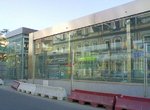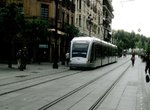Seville, Spain
![]()
Sevilla Metro-Centro Tram. Photo by Julio Hermosilla, 2008.
Overview
Seville’s Metro has its origin in a law approved in 1975, which designed a three-line radial network, with a hub in the historic centre of the city. The works advanced slowly, and in 1983, the project was abandoned for a “new definition of the system” after some problems with several buildings in the nearby historic centre, which had been declared a “World Heritage” site by Unesco.
Twenty years later, on May 21, 2002, the Transport Ministry of the Regional Government of Andalusia approved a new metro system for Seville and its metropolitan area (about 1,500,000 inhabitants according to INE 2008), which was absolutely different from the old one. This plan avoided the risks of penetrating the underground of the historic area, and planned a shuttle-tram line named “Metro-Centro”, to connect the closest metro station at “Puerta de Jerez”, with the Cathedral, the Royal Palace, and the business area of “Plaza Nueva” and C/ Sierpes, truly the heart of the town.
The new system's plan has four conventional metro lines inside the urban area, and shuttle trams to the most important suburban cities like Dos Hermanas, Alcalá de Guadaíra, and the Aljarafe area. Metro Line 1 was officially inaugurated on April 2, 2009. It runs about 18 km crossing the urban area from “Ciudad Expo” in the West, from “Olivar de Quintos” in the South-East, crossing also both branches of the river Guadalquivir, and counts with 22 stations, 17 of them underground and the rest elevated. The Metro system operates with low floor "light rail" type vehicles from CAF, with a 4 min. frequency.
The first phase of the Metro-Centro tram was inaugurated October 28, 2007, consisting of a route of 1.4 km from Plaza Nueva to Prado de San Sebastián, going across the Avda. Constitución, Puerta de Jerez and C/ San Fernando, inside a whole area now reserved to pedestrians, and connecting the historic district with the “outwalls” midtown. The tram has been very successful and in a few months it will be extended to the San Bernardo local train station, and then to the Santa Justa Central Station, the terminal of the Spanish high speed AVE trains from Madrid and other cities. The tram operates with a 5 min. frequency with light rail vehicles from CAF, numbered 101-117 (the same type vehicles used on the Metro lines), bidirectional and articulated with a capacity of 275 passengers. The railways are installed on a concrete platform, which is installed on top of a bed of elastic material to absorb noise and vibrations to the surrounding area.
The total cost of the infrastucture is over 600 millions euros, and although the hub of Puerta de Jerez will not be operative until next summer, it is expected the line will service 14 millions passengers during the first year.
Due to the complications found with the subsoil, formed by ancient marshlands, the stations on both sides of the river at the city centre have been placed at a 24-27 meters depth. The stations' design is open and clear, avoiding unnecessary passageways and all of them have facilities for handicapped people. For the first time in Spain, automatic doors have been installed along the platforms, synchronized with the trains to avoid accidents.
Three shuttle-tram lines are under construction to connect Metro Line 1, from the station “Univ. Pablo de Olavide” with “Parque Tecnológico” in Alcalá de Guadaíra, from “Ciudad Expo” with the Aljarafe sector, and from “Olivar de Quintos” with “Casilla de los Pinos” in Dos Hermanas, and it is forseen to begin the construction of Metro Line 2 during the early 2010. Should we wait for another 30 years? In that case, I am afraid I will not write the Chronicle!
Photo Gallery
| Five Random Images | ||||
 Image 90900 (56k, 640x480) Photo by: Julio Hermosilla |  Image 90904 (69k, 640x424) Photo by: Julio Hermosilla |  Image 90908 (67k, 640x424) Photo by: Julio Hermosilla |  Image 93352 (246k, 703x1043) Photo by: David Pirmann Location: Pl. de S. Francisco |  Image 107925 (222k, 1044x707) Photo by: Ian Folkard |
Page Credits
By Julio Hermosilla.